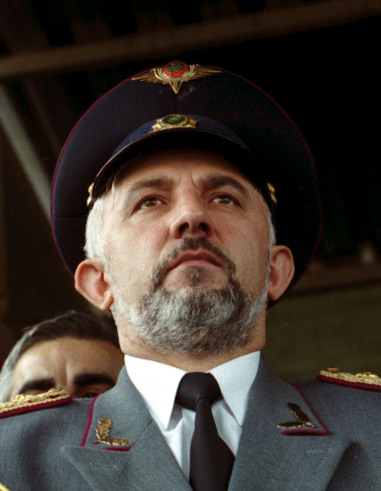
Aslan Maskhadov
Aslan (Khalid) Aliyevich Maskhadov (Russian: Асла́н (Хали́д) Али́евич Масха́дов; Chechen: Масхадан Али-воӀ Аслан (Халид), romanized: Masxadan Ali-voj Aslan (Xalid); 21 September 1951 – 8 March 2005) was a Soviet and Chechen politician and military commander who served as the third president of the unrecognized Chechen Republic of Ichkeria.
In this name that follows Eastern Slavic naming customs, the patronymic is Aliyevich and the family name is Maskhadov.
Aslan Maskhadov
Zelimkhan Yandarbiyev (acting)
Abdul-Halim Sadulayev (acting)
Office abolished
21 September 1951
Karaganda, Kazakh SSR, Soviet Union (now Kazakhstan)
8 March 2005 (aged 53)
Tolstoy-Yurt, Chechnya, Russia
Kusama Maskhadova
2
He was credited by many with the Chechen victory in the First Chechen War, which allowed for the establishment of the de facto independent Chechen Republic of Ichkeria. Maskhadov was elected President of Chechnya in January 1997. Following the start of the Second Chechen War in August 1999, he returned to leading the guerrilla resistance against the Russian army. De facto Ichkeria ceased to exist at the beginning of 2000. Until his death, Maskhadov was President in exile. He was killed in Tolstoy-Yurt, a village in northern Chechnya, in March 2005.[1]
Biography[edit]
Early life[edit]
On 21 September 1951, Aslan Aliyevich Maskhadov was born in Karaganda Region of the Kazakh Soviet Socialist Republic (SSR) of the Soviet Union, in the small village of Shakai, during the mass deportation of the Chechen people ordered in 1944 by Joseph Stalin. His family was from the Alaroy teip (of the Alkhan nek'e branch). In 1957, his family returned to Chechnya, where they settled in Zebir-Yurt, Nadterechny District.
Maskhadov joined the Soviet Army, trained in the neighbouring Georgian SSR and graduated from the Tbilisi Artillery School in 1972. He then graduated with honours from the Leningrad Kalinin Higher Artillery in 1981.[2] He was posted to Hungary with a self-propelled artillery regiment until 1986 and then from 1986 in the Baltic Military District. He served from 1990 as the chief of staff of Soviet missile and artillery forces in Vilnius, capital of the Lithuanian SSR. In January 1991, Maskhadov participated in the January Events, the seizure of the television tower by Soviet troops (which he regretted later), but didn't participate in the assault itself.[2] During his service in the Soviet Army, he was presented with two Orders For Service to Homeland. Maskhadov retired from the Soviet Army in 1992 with the rank of a colonel and returned to his native land. He was at the head of ChRI civil defence from late 1992 to November 1993.
After the dissolution of the Soviet Union, in the summer of 1993, Maskhadov took part in raids on the armed opposition against the government of Dzhokhar Dudayev in the Urus-Martan, Nadterechny, and Gudermes districts. An unsuccessful anti-Dudayev mutiny in November 1993 resulted in the dismissal of Viskhan Shakhabov as chief of staff of the Chechen armed forces, Maskhadov was appointed as the acting chief of staff and, in March 1994, as the chief of staff.
Family life[edit]
He married at the age of 17. His wife Kusama holds a graduate degree in teaching. They had two children: a son, who took part in military action during the First Russian-Chechen War, and a daughter.
